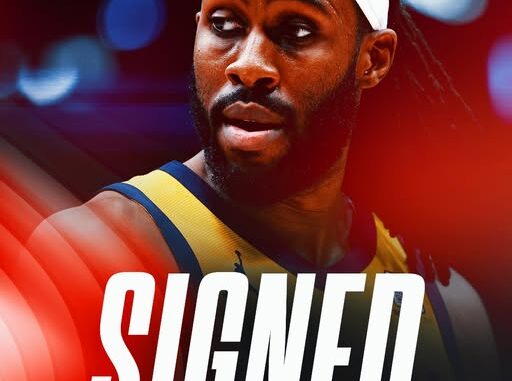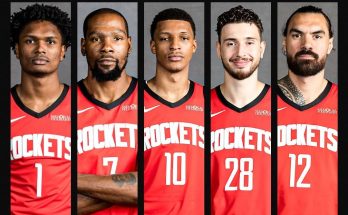Free agent center Isaiah Jackson has agreed to a three-year, $21 million deal to return to the Indiana Pacers. The agreement, reported by Shams Charania, signals the Pacers’ continued investment in a young, athletic frontcourt as they position themselves for sustained success in the Eastern Conference. For Jackson, it represents both a second chance and a significant show of faith from the team that drafted him and helped develop his early NBA career.
At just 23 years old, Isaiah Jackson has already experienced the highs and lows of life in the league. Drafted in the first round in 2021 after a standout season at Kentucky, Jackson quickly showed promise as an athletic shot-blocker and rim-runner. His energy off the bench, defensive instincts, and vertical explosiveness made him a favorite among Pacers fans who appreciated his hustle and potential.
Early in his career, Jackson demonstrated an ability to impact games despite limited minutes. He averaged over 1.5 blocks per game in both of his first two seasons while playing under 20 minutes per night. His timing on blocks and willingness to challenge shots at the rim stood out, and he was frequently mentioned as one of the most underrated defenders in his draft class. Offensively, he was largely a finisher around the rim, often benefiting from pick-and-roll opportunities and dump-off passes. Though his offensive game was limited, his efficiency near the basket and activity on the offensive glass made him valuable.
However, just as Jackson began to solidify his place in the Pacers’ rotation, injuries slowed his momentum. In the 2024-25 season, Jackson played only five games before suffering a devastating Achilles injury. It was a major setback for a young player whose game is largely built on athleticism. Achilles injuries are notoriously difficult to return from, especially for big men, and there were serious questions about what kind of player Jackson would be when he returned.
Despite those concerns, the Pacers opted to re-sign him—committing to a three-year deal that balances risk and reward. For Indiana, this move shows confidence in Jackson’s recovery and belief in his long-term potential. A $21 million commitment over three years is relatively modest by modern NBA standards, and if Jackson returns to form, it could end up being one of the better value contracts in the league. For Jackson, it provides financial security and a clear runway to reclaim a role in the team’s evolving rotation.
This move comes at a time of transition for the Pacers’ frontcourt. Myles Turner, who had anchored Indiana’s defense for nearly a decade, left in free agency. His departure leaves a significant hole in terms of rim protection, floor spacing, and veteran leadership. With Jackson returning, the Pacers are turning to a younger, more versatile group of big men to fill that gap.
Indiana has also added other bigs to their roster, including Jay Huff and James Wiseman, creating a new-look frontcourt built around length, athleticism, and defensive upside. While none of them individually can replicate everything Turner brought, together they form a rotation that offers flexibility and matchup versatility. Jackson figures to be a key piece in that puzzle, especially if he can regain his pre-injury explosiveness.
One of the reasons the Pacers remain high on Jackson is his ability to change the pace and energy of a game. He doesn’t need the ball to make an impact—he runs the floor, crashes the boards, and contests shots. He fits well next to ball-dominant players like Tyrese Haliburton and Pascal Siakam, providing vertical spacing and second-chance opportunities without disrupting offensive flow. His presence allows Indiana to play faster and more aggressively on defense, especially when paired with switchable forwards and active perimeter defenders.
Jackson’s new deal also reflects Indiana’s broader approach to roster building. The Pacers have built a strong core through smart drafting, savvy trades, and player development. Haliburton is the face of the franchise, but players like Bennedict Mathurin, Andrew Nembhard, Jarace Walker, and now Jackson represent the next wave of contributors. By locking in young players on team-friendly deals, Indiana is setting itself up for flexibility and sustained success over the next several seasons.
For Jackson, this contract is a vote of confidence that also comes with expectations. After missing nearly an entire season, he’ll need to prove that he can stay healthy and that his game hasn’t taken a step back. The Achilles injury is no small hurdle, but Jackson has youth on his side. Modern medicine and rehab protocols have helped other players return successfully from similar injuries, though it often takes time to fully regain explosiveness and trust in the body.
The Pacers will likely be cautious in ramping up Jackson’s minutes early in the season. They have the depth to bring him along slowly, using Huff and Wiseman as needed. But if Jackson can recapture his old form—or even develop beyond it—he has a real opportunity to claim a bigger role than ever before. His pathway to a starting job isn’t blocked by any dominant presence, and his skill set remains unique on the roster.
It will be interesting to see whether Jackson can expand his offensive game over the course of this contract. He has shown flashes of touch around the rim and even hinted at some midrange ability, though his range has yet to fully extend beyond the arc. If he can develop even a reliable short jumper or a consistent floater, it would open up new dimensions for Indiana’s offense. On the other hand, even if Jackson never becomes a high-usage scorer, his elite defensive tools and rebounding can keep him on the floor in high-leverage moments.
The timing of this deal also aligns with the Pacers’ larger ambitions. After a strong showing in the 2024 playoffs, Indiana is aiming to build on its momentum. They’ve transitioned from a rebuilding team into a legitimate playoff threat, and their front office has made it clear that they’re ready to compete now. Jackson’s re-signing, along with other key moves, keeps the roster young but playoff-ready.
Another factor working in Jackson’s favor is the strong locker room culture in Indiana. Players and coaches alike have praised the team’s chemistry, work ethic, and development staff. Jackson is returning to a familiar system, with a coaching staff that understands his strengths and is invested in his growth. That continuity could make a huge difference as he works his way back from injury.
There’s also an emotional element to Jackson’s return. He’s grown up in Indiana—both as a player and a person. He entered the league as a teenager, and over the past few years, he’s become part of the fabric of the Pacers’ community. Re-signing him sends a message to players around the league that the Pacers take care of their own and that hard work and perseverance are rewarded.
Looking ahead, the next few months will be critical for Jackson. Training camp will offer the first real look at his physical recovery, and preseason games will give fans and coaches a chance to evaluate where he stands. The hope is that by midseason, Jackson is back to playing full minutes and contributing meaningfully. If all goes well, he could be one of the league’s best comeback stories—and a central figure in Indiana’s playoff push.
But the road won’t be easy. The Eastern Conference is stacked with talent, and the margin for error is small. For Indiana to take the next step, their young players—including Jackson—will need to grow quickly. That means improving consistency, staying healthy, and rising to the occasion when it matters most. Jackson’s deal is not just a reward for past performance—it’s a bet on what’s to come.
In many ways, this agreement reflects what the modern NBA is all about: balancing potential with production, development with results, and risk with reward. Isaiah Jackson may not be a household name, but he has all the tools to become a game-changer. And now, with a fresh contract and a team that believes in him, he has the platform to prove it.



